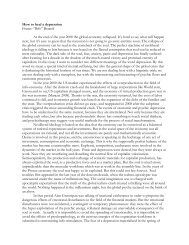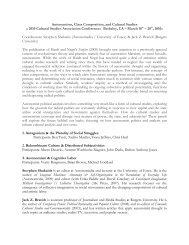nanopolitics handbook - Minor Compositions
nanopolitics handbook - Minor Compositions
nanopolitics handbook - Minor Compositions
Create successful ePaper yourself
Turn your PDF publications into a flip-book with our unique Google optimized e-Paper software.
means of expression; indeed, ‘affective and ethico-political forces are firstlyexpressed by the voice’. 1 The voice, in its expression of affective and ethicopoliticalforces, creates worlds. The utterances of speakers open up spacesfor different ways of being through dialogue: through their anticipation of aresponse. 2 The ways that voices are shaped by, and shape, worlds and spaces,reveals the creative and constitutive operations of speech and language. Thisunderstanding looks to the voice, and speech, as more than a conduit for thetransfer of information. Emphasised from this view is not only the reciprocaland active process of creating worlds and meanings, but also the extralinguisticelements of communication: the soundings, gestures and affectivetransmissions that make up our different relations.By tuning into these affective and auditory elements, we may imaginean acoustic politics of the voice, whereby sound helps us to engage in, andelaborate upon, contemporary globalised political landscapes. Such a politicsmight help us to become more attuned to the ways in which voices areproduced by, and productive of, relations, geographies and subjectivities.These are tied to projections and positions of class, race, education, culture,social value, sexuality and so forth. Unlike ideas of communication that seethe speaker as active, and the listener as passive, we come to understand thatas listeners we actively contribute to the spaces that utterances compel. Wefurther see how such aspects play out in the sonic inflections of the voice, notonly in their linguistic content, through paying particular attention to pace,accent and dialect, intonation, frequency, amplitude, and silence. The waysthat these play out affect our capacity to listen and to respond to one another.If we are seeking to build relations alternative to those typical of capitalism,developing sensitivities to how we might speak and listen differently iscrucial because they can help us to find ways to relate to ourselves and othersdifferently, with care and with generosity.Several recordings accompany this piece and you are invited to listen to themas you read the text; they are available here: soundcloud.com/anja_k/sets/asonic-geography-of-voice.By bringing these different voices into relation,I extend a desire for more convivial and caring practices of listening. 3 Twokinds of sound recording are heard: firstly, recordings of speech and soundphenomena taken from a variety of archives that directly illustrate the sonicqualities spoken about. The second of each recording is a compilation of shortrecordings with friends involved in radical political organising, coming fromcampaigns around feminism, migration, labour, gender and queer politics,permaculture and education struggles in the UK, Germany and Australia.Within much of this kind of organisation there is some awareness of howwe speak to each other, the vocabularies we use and the articulations of236










